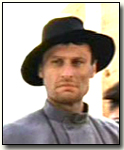Serving as an interesting counterbalance to the narrative hokum is the core of "Jerusalem," a story about the persuasiveness of religious faith, its coercive power and its human limitations. The film is also a tripartite love story, concerned with love of God and love of land as well as the love between man and woman.
Even as little children, raised together in a turn-of-the-century Swedish village though not actually brother and sister, Ingmar and Gertrud seem destined to marry. But the dance that brings them together also sounds a cautionary note: It's disrupted by a terrible storm and all the young people worry whether their actions have brought God's wrath down on them.
The centrality of religion in everyone's lives is upped a notch when a messianic fundamentalist preacher named Hellgum comes to town, confidently insisting that the end is near. With some saying he is a man of God, others calling him a mad swindler, Hellgum's presence splits the village.
Ingmar's well-to-do sister Karin sides with Hellgum, and, with Ingmar away for months trying to earn money so they can marry, Gertrud is tempted as well. Adding complications is Hellgum's passion for the Holy Land, his belief that all Christians are being called there to help build the New Jerusalem.
Lagerlof's original novel was inspired by Swedes who made a circa 1900 pilgrimage to Palestine, and writer-director August, who dedicates his film to the same people, is careful not to be judgmental. Despite the myriad pulpy turns this plot takes, no one's sincerity is ever questioned; everyone, even those whose choices turn out badly, is allowed the grace of having their faith taken seriously.
Working as usual with cinematographer Jorgen Persson, whose credits go back to "Elvira Madigan," August has filled "Jerusalem" with beautifully mounted re-creations of Swedish village life. Though it doesn't have a trendy bone in its body, "Jerusalem" leaves you feeling you've experienced something.













